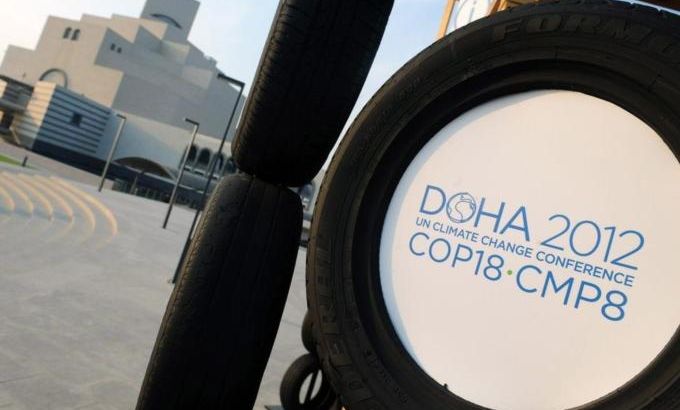
Climate talks: More hot air about hot air?
As another round of UN climate talks begin, we ask what such negotiations really achieve.
Hurricanes, heatwaves, fires, floods and famine. The evidence is growing that links extreme weather to global warming.
And yet another round of United Nations climate talks begin – this time in Qatar. But where is all the hot air getting us in dealing with all the hot air?
Keep reading
list of 4 itemsThousands evacuate as wildfire grows ‘dramatically’ in western Canada
Guardians of the glaciers – life alongside Pakistan’s vanishing ice
Photos: Kenya sanctuaries toil to save birds of prey from extinction
|
“This is a climate problem that is being caused by the rich countries, and they don’t suffer – yet – that much [from] climate change. It’s the least developed countries that suffer from it, but they haven’t really contributed to it …. The ones who are causing it can deal with it and the ones who didn’t cause it are suffering from it. And that is really the core problem of this issue.” – Bas Eickhout, from the Group of Greens |
As part of COP18, nearly 200 nations are gathering in Qatar to discuss the fight against global warming.
UN talks have been taking place for some 20 years now.
But as yet, they have failed to fulfil their main purpose: to actually reduce greenhouse gas emissions.
When a UN panel concluded that the man-made gases were increasing the temperature of the Earth, they called for action.
A UN climate change panel was formed in 1990, and after seven years of negotiations, in 1997, the Kyoto Protocol was born.
All the world’s industrialised nations signed on, promising to reduce emissions to below 1990 levels.
The accord finally took effect in 2005, but by then it was greatly watered down.
The US, which initially signed on, did not ratify the deal and does not have to meet any of the accord’s targets.
And China is also not required to reduce emissions.
|
“It is very much a question of equity and justice. So it is not really about just admonishing the US for political bad behaviour. It is about understanding that this whole convention that the US is technically legally bound to, because they are parties to it, is based upon a set of values and those include very strongly historical responsibility.“ – Anjali Appadurai, from Earth in Brackets |
China and the US are by far and away the world’s worst polluters.
China, the planet’s most populated country, also emits the most greenhouse gases: some six billion tonnes a year. That is a rise of 171 per cent since 2000.
The US – the world’s largest economy – produces more than five billion tonnes. But its emissions have fallen since 2007.
India’s boom has made it the third worst emitter of greenhouse gases, pumping out nearly two billion tonnes of CO2 a year, while Russia produces more than one-and-a-half billion tonnes of emissions.
The Kyoto Protocol expires at the end of this year, and the COP18 summit in Doha is largely about determining what comes next.
Which brings us to the ever-looming question: What do these climate talks actually achieve?
To discuss this, Inside Story, with presenter David Foster, is joined by guests: Pa Ousman, the chair of the Least Developed Countries group, which is made up of 48 nations that work together in the negotiations; Anjali Appadurai from Earth in Brackets, a youth organisation dedicated to sustainability and making the UN more accessible; and Bas Eickhout, a member of the European Parliament from the Group of Greens.
|
“There’s no doubt that for us to take on climate change in a serious way would involve making some tough political choices …. If the message is somehow we are going to ignore jobs and growth simply to address climate change, I don’t think anybody is going to go for that.” Barack Obama, the US president |
CLIMATE CHANGE:
- Delegates from 194 nations are gathering in Doha for the COP18 climate talks
- The conference takes place from November 26 to December 7
- UN climate change talks aim to curb gas emissions by 20 per cent by 2020
- Developing nations say agreement on emission cuts relies on rich states
- Developing nations say rich states must make bigger cuts in emissions
- China is the world’s biggest emitter of gases that trap the sun’s heat
- The US, India and Russia are the biggest greenhouse gas emitters after China
- According to a UN report: CO2 levels in the atmosphere have risen by 20 per cent since 2000
- Scientists say CO2 traps heat in the atmosphere causing the Earth to warm
- According to a UN report: there is an at least 66 per cent chance that changes in weather are man-made